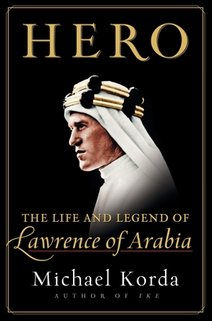
19 Nov 2010 01:26:25
Anyone born after 1950 is probably familiar with the story of the man better known as Lawrence of Arabia from David Lean's majestic 1962 film starring Peter O'Toole as the charismatic and controversial leader of the Arab revolt against the Ottoman Empire during World War I.
Even a nearly four-hour epic like Lean's can only paint a life as complex as Lawrence's in broad strokes. For those interested in detail and nuance, as well as a thrilling adventure story, Michael Korda has written a new, 700-page biography about his boyhood hero.
Relying on previous biographies as well as Lawrence's own war memoir, "Seven Pillars of Wisdom," Korda, the former editor in chief of Simon and Schuster, attempts to reconcile history's two sharply different views of the Oxford-educated soldier-scholar.
To his admirers, Lawrence was a brilliant, courageous warrior whose unconventional tactics and strategy place him among the greatest military leaders in history. To his critics, he was a self-aggrandizing, manipulative liar who exaggerated his own role in the Arab uprising against the Turks.
As the title suggests, Korda firmly believes Lawrence was a hero, someone who knew from an early age that he was destined for greatness and pushed himself ferociously to be ready when the opportunity arose.
While Korda doesn't stint on battlefield heroics, he also attempts, with great compassion, to explicate the demons that tormented Lawrence until his untimely death in a motorcycle accident in 1935 at age 46.
For one thing, Lawrence never got over the stigma of his illegitimate birth. In addition, he struggled to live up to the impossibly high expectations of his fiercely religious and domineering mother. Most important, he was wracked with guilt for his inability to win for the Arabs the great empire he had urged them to fight and die for.
Despite his flair for self-dramatization — he will forever be remembered in white, flowing robes and headdress, mounted on a camel — Korda shows that Lawrence was an enormously skillful diplomat with uncanny insight into the geography, politics and religions of the former Turkish empire.
Korda persuasively argues that had Lawrence's vision for a Mideast peace prevailed after the war — a plan that recognized differences between Sunni and Shiite Muslims, as well as Kurdish claims for an independent state — that deeply troubled part of the world might be a far more peaceful, prosperous region than it is today.
Even a nearly four-hour epic like Lean's can only paint a life as complex as Lawrence's in broad strokes. For those interested in detail and nuance, as well as a thrilling adventure story, Michael Korda has written a new, 700-page biography about his boyhood hero.
Relying on previous biographies as well as Lawrence's own war memoir, "Seven Pillars of Wisdom," Korda, the former editor in chief of Simon and Schuster, attempts to reconcile history's two sharply different views of the Oxford-educated soldier-scholar.
To his admirers, Lawrence was a brilliant, courageous warrior whose unconventional tactics and strategy place him among the greatest military leaders in history. To his critics, he was a self-aggrandizing, manipulative liar who exaggerated his own role in the Arab uprising against the Turks.
As the title suggests, Korda firmly believes Lawrence was a hero, someone who knew from an early age that he was destined for greatness and pushed himself ferociously to be ready when the opportunity arose.
While Korda doesn't stint on battlefield heroics, he also attempts, with great compassion, to explicate the demons that tormented Lawrence until his untimely death in a motorcycle accident in 1935 at age 46.
For one thing, Lawrence never got over the stigma of his illegitimate birth. In addition, he struggled to live up to the impossibly high expectations of his fiercely religious and domineering mother. Most important, he was wracked with guilt for his inability to win for the Arabs the great empire he had urged them to fight and die for.
Despite his flair for self-dramatization — he will forever be remembered in white, flowing robes and headdress, mounted on a camel — Korda shows that Lawrence was an enormously skillful diplomat with uncanny insight into the geography, politics and religions of the former Turkish empire.
Korda persuasively argues that had Lawrence's vision for a Mideast peace prevailed after the war — a plan that recognized differences between Sunni and Shiite Muslims, as well as Kurdish claims for an independent state — that deeply troubled part of the world might be a far more peaceful, prosperous region than it is today.

